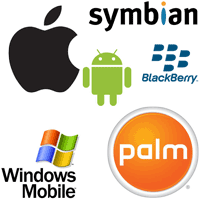 The smartphone OS battle is finally starting to take shape and I’ve decided to take a closer look at what the marketplace has to offer. Years ago the most critical thing that people would store on their phones were the actual phone numbers and most likely that got saved to a SIM card. Now, phones a have a wealth of info on them and utilizing some sort of smartphone OS is a must. There is no point in getting a cheap phone and then realizing you can’t sync your data, if the only option is to manually enter in the data…that is a major #FAIL.
The smartphone OS battle is finally starting to take shape and I’ve decided to take a closer look at what the marketplace has to offer. Years ago the most critical thing that people would store on their phones were the actual phone numbers and most likely that got saved to a SIM card. Now, phones a have a wealth of info on them and utilizing some sort of smartphone OS is a must. There is no point in getting a cheap phone and then realizing you can’t sync your data, if the only option is to manually enter in the data…that is a major #FAIL.
From my perspective there are 6 players in the battle to be Number 1, I’ll go through each one:
6. Nokia/Symbian – Wow, these guys have really lost there way. 10 years ago Nokia was the phone to have in Asia/Europe but now they are quickly losing market share. Even more pressing for them is that their Symbian software is withering, no real programmer is programming for the platform. And in today’s environment it’s all about the apps that run on a phone. Symbian reminds me of the IBM OS/2 days – Big company, no new customers and zero apps.
5. Palm WebOS – Not even former Apple exec Jon Rubinstein, current CEO of Palm, can save them. The OS is stunning and slick, but they don’t have a chance with some of the bigger players down the list. They should just open source it and work with the smaller cellphone makers.
4. Windows Mobile – Bloated.
3. BlackBerry – About a year ago, I was singing the “BlackBerry will die in 18 months” song, but I’ve changed my tune. BlackBerry seems to have really put the pedal to the metal and appears to be doing well. I recently had the chance to configure a new BlackBerry for email and it took me 5 minutes, compare that to the first BlackBerry I bought 5 years ago where it took me 30 minutes and my current iPhone which takes about 7 minutes. Kudos to the kids from Canada…welcome to North America.
2. Android – 2009 was supposed to be the year of the Android, that didn’t really pan out. The recently launched Motorola DROID phone is a customized version of Android and is said to be making waves. I expect a ton of new phones from Samsung, LG and HTC to flood the market and bring the prices down, which are currently hovering around USD 400-500 for a phone. The Android Marketplace has not taken off but that’s also driven by the fact that not many Android phones are in the hands of the consumer. 2010 seems to be the year for the Google Gang.
1. Apple iPhone – Beyond being an Apple fan there are some real business justifications for it being the king of the OS. First, they completely changed the game with the app store, this is not only a way to keep people on the iPhone platform but also another revenue stream for them – 30% to Apple and 70% for the developer. Symbian, BlackBerry and Windows have been around for years and not one of them thought about offering a store but once Apple announced, they all announced their intentions. Where Apple excels is that developers not only create programs for the iPhone but also the iPod touch (I believe over 80 million devices combined). Since both devices have the same screen size and resolution the user experience is the same and saves on development costs. Whereas, if you program for the Symbian/BlackBerry/Windows/Android every device is different – screen size, resolution, physical keyboard, etc…which leads to long development timeframes. The iPhone OS still has a way to go in terms of features but is quickly gaining and in the meantime grabbing hugh chucks of the market share.
Once again, with all these options the consumer is the real winner and should lead to lower prices and more features in the future.

